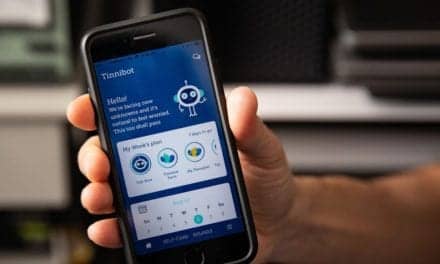An international team, including a University of Minnesota professor, has published a second large clinical trial for a novel neuromodulation device, Lenire, that could reduce symptoms for millions worldwide with tinnitus, commonly described as “ringing in the ears.” Researchers published the results of the Treatment Evaluation of Neuromodulation for Tinnitus – Stage A2 (TENT-A2) clinical trial in Nature – Scientific Reports. An article detailing the research appears on the University of Minnesota website.
Hubert Lim, a professor in the U of M’s Department of Biomedical Engineering and the Department of Otolaryngology, was the senior author of the study sponsored by Neuromod Devices. Lim also serves as chief scientific officer of Neuromod Devices.
The TENT-A2 trial is Neuromod’s second large-scale clinical trial, and sought to replicate and further enhance the results demonstrated in the company’s TENT-A1 trial that evaluated the safety and efficacy of Lenire, the company’s non-invasive bimodal neuromodulation approach that uses sound combined with electrical stimulation on the surface of the tongue to treat tinnitus.
Like the first clinical trial, participants in the Neuromod second clinical trial were instructed to use Lenire for 60 minutes each day for 12 weeks. However, after an initial six weeks of treatment, the timing and delivery of the audio and tongue stimuli were changed for participants of the second trial for their remaining six weeks of treatment. This change in treatment regimen resulted in a greater average reduction in tinnitus symptom severity achieved by treatment compliant participants compared to the first trial.
Results include:
- At least 80% of participants experienced a reduction in their tinnitus symptoms after 12 weeks of treatment;
- Treatment compliant participants achieved an average improvement in tinnitus symptoms of almost three times the clinically defined criterion;
- 88% said they would recommend Lenire treatment to others with tinnitus.
“I am proud of our company’s ability to build on our prior research by enrolling 191 participants in another large-scale clinical trial that showed even greater improvements in tinnitus symptoms compared to our previous large-scale study when implementing a new stimulation regimen in which the stimulus features were adjusted over time,” said Lim. “The successful completion of two large-scale trials is a major milestone in our continuing work to develop a treatment to help as many people living with tinnitus and in further demonstrating bimodal neuromodulation as a safe and effective intervention for people living with the condition.”
To read more about the study results and Neuromod Devices Ltd, visit the Neuromod website.
Original Paper: Conlon B, Hamilton C, Meade E, et al. Different bimodal neuromodulation settings reduce tinnitus symptoms in a large randomized trial. Scientific Reports. 2022;12(10845).
Source: University of Minnesota, Neuromod, Scientific Reports
Image: University of Minnesota






